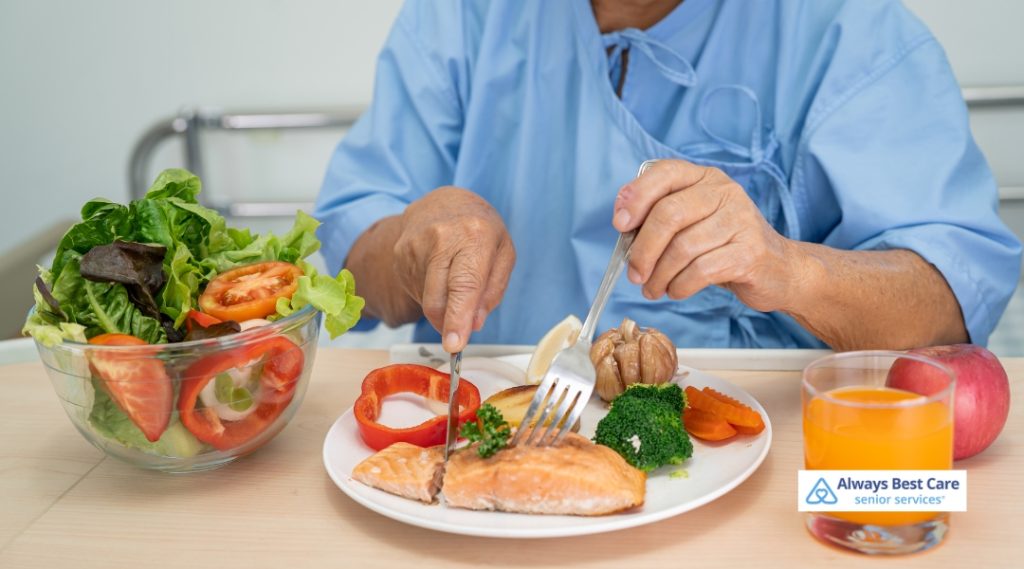Nourishing Love: Boosting Appetite in Seniors with Healthy Eating Habits

As we age, our appetites can dwindle, leading to nutritional deficiencies and health issues.
For seniors, maintaining a healthy diet is crucial for energy, independence, and overall well-being.
However, factors like medication side effects, dental problems, or loneliness can make mealtime a challenge.
In Lexington, KY, Always Best Care is dedicated to helping seniors enjoy healthy eating again.
So, how can we make meals more appealing and ensure our loved ones get the nutrients they need?
What you will learn:
- The most common reasons seniors in Lexington, KY, may experience a loss of appetite.
- Practical strategies to make meals more appealing and enjoyable.
- Tips for overcoming eating challenges.
- How compassionate in-home care from Always Best Care of Lexington can support healthy eating habits, provide companionship, and help your loved one maintain nutrition and independence at home.
Table of Contents
Understanding the Underlying Causes
Before we can fix the problem, we need to figure out why our seniors aren’t eating well.
Common culprits include:
- Medication side effects, like nausea or dry mouth|
- Dental issues or ill-fitting dentures
- Difficulty chewing or swallowing
- Depression, isolation, or grief
- Chronic health conditions
- Loss of taste or smell
It’s essential to talk to your loved one’s doctor to rule out any medical causes. Addressing these issues is the first step toward improving their relationship with food.

Making Meals More Appealing
Seniors are more likely to eat when food looks and smells good. Here are some tips to make meals more inviting:
- Enhance visual appeal with colorful fruits and veggies.
- Use attractive plates and add herbs and spices for flavor without excess salt.
- Create a cozy atmosphere with soft lighting and pleasant music.
Serving Smaller, More Frequent Meals
Large meals can be overwhelming, especially for those with smaller appetites. Try offering:
- Three small meals and two to three snacks throughout the day.
- Nutrient-dense snacks like yogurt, smoothies, cheese, or nuts.

Eating Together
Eating is often a social activity. Sharing meals with your loved one can make a big difference. If you can’t be there regularly, arrange for others to join them.
Making Eating Easier
If chewing or swallowing is tough, focus on:
- Soft, easy-to-eat foods like scrambled eggs, mashed potatoes, oatmeal, or soups.
- Properly fitting dentures and addressing mouth pain.
Planning Ahead and Getting Creative
Meal planning can eliminate stress and encourage variety. Involve your loved one in choosing meals and groceries so they feel more engaged. Try new recipes and incorporate favorite comfort foods to renew their interest in eating.

How Always Best Care of Lexington Can Help
Maintaining good nutrition doesn’t have to fall entirely on your shoulders.
At Always Best Care, our experienced caregivers can assist with meal planning, grocery shopping, and preparing tasty, nutritious meals tailored to your loved one’s preferences and dietary needs.
Whether it’s encouraging hydration, adjusting meals for swallowing difficulties, or simply providing companionship during mealtime, we’re here to help make eating a positive experience again.
FAQ
Q: Why is nutrition important for seniors?
A: Proper nutrition helps maintain energy, independence, and overall health. It supports cognitive function, bone health, and immune system strength.
Q: How can I make meals more appealing to seniors?
A: Use colorful fruits and veggies, attractive plates, and herbs and spices for flavor. Create a cozy atmosphere with soft lighting and music.
Q: What if my senior has difficulty chewing or swallowing?
A: Focus on soft, easy-to-eat foods like scrambled eggs or soups. Ensure dentures fit properly and address any mouth pain.
Schedule Your Free Consultation With Always Best Care of Lexington!
If your aging loved one is struggling with appetite loss or needs support with daily routines, contact Always Best Care of Lexington at (859) 305-0060 to schedule a care consultation. Our compassionate caregivers are here to support health, wellness, and independence—starting right at the kitchen table.





